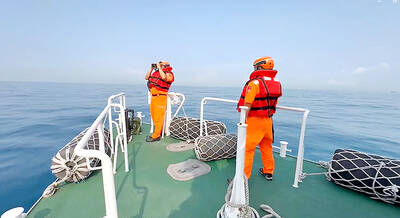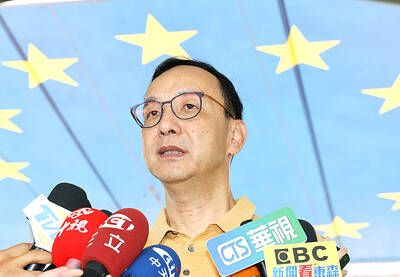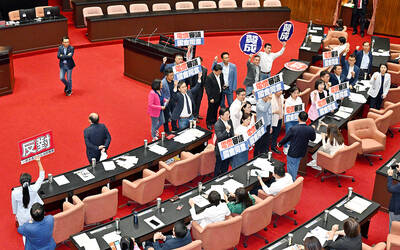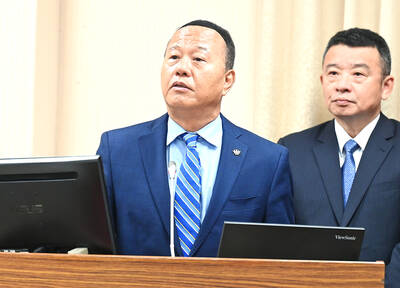The establishment of the Taiwan People’s Party (TPP) would affect the New Power Party (NPP) more than any other, NPP Legislator Huang Kuo-chang (黃國昌) said yesterday.
Taipei Mayor Ko Wen-je (柯文哲), who founded the TPP, on Tuesday said that it plans to nominate at least 34 legislators-at-large in next year’s legislative elections.
The TPP would not make the same mistake as the NPP, which nominated only six candidates for legislators-at-large in its first legislative elections in 2016, Ko said.
“Ko’s new party will have the biggest impact on the NPP,” Huang said on Facebook.
Nonetheless, he said he was happy to see the new party formed, because it is normal for political parties to have to compete for voters’ support.
As with every other new party, the TPP must stand up to public scrutiny in terms of the quality of its politicians, as well as its core values and platforms, the former NPP chairman said.
“It cannot simply rely on Ko’s personal charisma,” Huang said, adding that it would have to stand the test of time.
Meanwhile, NPP caucus whip Hsu Yung-ming (徐永明) said that the TPP lacked core values.
Ko saying that the TPP’s legislators would represent his will in the Legislative Yuan and the party allowing its members to have membership in other parties show that Ko has no core values, Hsu said on Facebook.
“Does Ko plan to join the legislative elections because he hopes to break the political duopoly [of the Chinese Nationalist Party (KMT) and the Democratic Progressive Party], or because he thinks it would help his team at the Taipei City Government in negotiations with the central government on cases such as the Taipei Twin Tower development project?” Hsu asked.
As many TPP members are high-ranking officials in the Taipei City Government, if they join the legislative elections in January next year it could seriously affect the city government’s operations, he said.
“I would like to remind Ko to not turn the city government into an election campaign office. We already have a mayor who is not doing his job in Kaohsiung; do not let the same thing happen in Taipei,” Hsu said.
As an elected official, Ko should reassure the public that his newly founded party would not affect his role as Taipei mayor, Hsu added.

An increase in Taiwanese boats using China-made automatic identification systems (AIS) could confuse coast guards patrolling waters off Taiwan’s southwest coast and become a loophole in the national security system, sources familiar with the matter said yesterday. Taiwan ADIZ, a Facebook page created by enthusiasts who monitor Chinese military activities in airspace and waters off Taiwan’s southwest coast, on Saturday identified what seemed to be a Chinese cargo container ship near Penghu County. The Coast Guard Administration went to the location after receiving the tip and found that it was a Taiwanese yacht, which had a Chinese AIS installed. Similar instances had also

GOOD DIPLOMACY: The KMT has maintained close contact with representative offices in Taiwan and had extended an invitation to Russia as well, the KMT said The Chinese Nationalist Party (KMT) would “appropriately handle” the fallout from an invitation it had extended to Russia’s representative to Taipei to attend its international banquet last month, KMT Chairman Eric Chu (朱立倫) said yesterday. US and EU representatives in Taiwan boycotted the event, and only later agreed to attend after the KMT rescinded its invitation to the Russian representative. The KMT has maintained long-term close contact with all representative offices and embassies in Taiwan, and had extended the invitation as a practice of good diplomacy, Chu said. “Some EU countries have expressed their opinions of Russia, and the KMT respects that,” he

AMENDMENT: Contact with certain individuals in China, Hong Kong and Macau must be reported, and failure to comply could result in a prison sentence, the proposal stated The Chinese Nationalist Party (KMT) and the Taiwan People’s Party (TPP) yesterday voted against a proposed bill by Democratic Progressive Party (DPP) lawmakers that would require elected officials to seek approval before visiting China. DPP Legislator Puma Shen’s (沈伯洋) proposed amendments to the Act Governing Relations Between the People of the Taiwan Area and the Mainland Area (臺灣地區與大陸地區人民關係條例), stipulate that contact with certain individuals in China, Hong Kong and Macau should be reported, while failure to comply would be punishable by prison sentences of up to three years, alongside a fine of NT$10 million (US$309,041). Fifty-six voted with the TPP in opposition

VIGILANCE: The military is paying close attention to actions that might damage peace and stability in the region, the deputy minister of national defense said The People’s Republic of China (PRC) might consider initiating a hack on Taiwanese networks on May 20, the day of the inauguration ceremony of president-elect William Lai (賴清德), sources familiar with cross-strait issues said. While US Secretary of State Anthony Blinken’s statement of the US expectation “that all sides will conduct themselves with restraint and prudence in the period ahead” would prevent military actions by China, Beijing could still try to sabotage Taiwan’s inauguration ceremony, the source said. China might gain access to the video screens outside of the Presidential Office Building and display embarrassing messages from Beijing, such as congratulating Lai